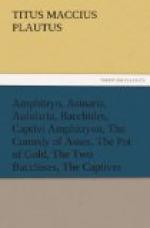But whatever standards be applied to his plays their outstanding characters, their amusing situations, their vigour and comicality of dialogue remain. Euclio and Pyrgopolynices, the straits of the brothers Menaechmus and the postponement of Argyrippus’s desires, the verbal encounter of Tranio and Grumio, of Trachalio and the fishermen— characters, situations, and dialogues such as these should survive because of their own excellence, not because of modern imitations and parallels such as Harpagon and Parolles, the misadventures of the brothers Antipholus and Juliet’s difficulties with her nurse, the remarks of Petruchio to the tailor, of Touchstone to William.
Though his best drawn characters can and should stand by themselves, it is interesting to note how many favourite personages in the modern drama and in modern fiction Plautus at least prefigures. Long though the list is, it does not contain a large proportion of thoroughly respectable names: Plautus rarely introduces us to people, male or female, whom we should care to have long in the same house with us. A real lady seldom appears in these comedies, and—to approach a paradox—when she does she usually comes perilously close to being no lady; the same is usually true of the real gentleman. The generalization in the Epilogue of The Captives may well be made particular: “Plautus finds few plays such as this which make good men better.” Yet there is little in his plays which makes men—to say nothing of good men—worse. A bluff Shakespearean coarseness of thought and expression there often is, together with a number of atrocious characters and scenes and situations. But compared with the worst of a Congreve or a Wycherley, compared with the worst of our own contemporary plays and musical comedies, the worst of Plautus, now because of its being too revolting, now because of its being too laughable, is innocuous. His moral land is one of black and white, mostly black, without many of those really dangerous half-lights and shadows in which too many of our present day playwrights virtuously invite us to skulk and peer and speculate.
Comparatively harmless though they are, the translator has felt obliged to dilute certain phrases and lines.
The text accompanying his version is that of Leo, published by Weidmann, 1895-96. In the few cases where he has departed from this text brief critical notes are given; a few changes in punctuation have been accepted without comment. In view of the wish of the Editors of the Library that the text pages be printed without unnecessary defacements, it has seemed best to omit the lines that Leo brackets as un-Plautine[16]: attention is called to the omission in each case and the omitted lines are given in the note; the numbering, of course, is kept unchanged. Leo’s daggers and asterisks indicating corruption and lacunae are omitted, again with brief notes in each case.




